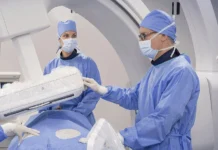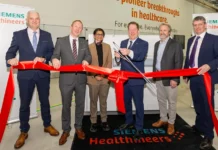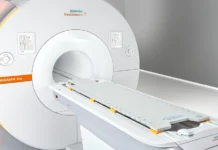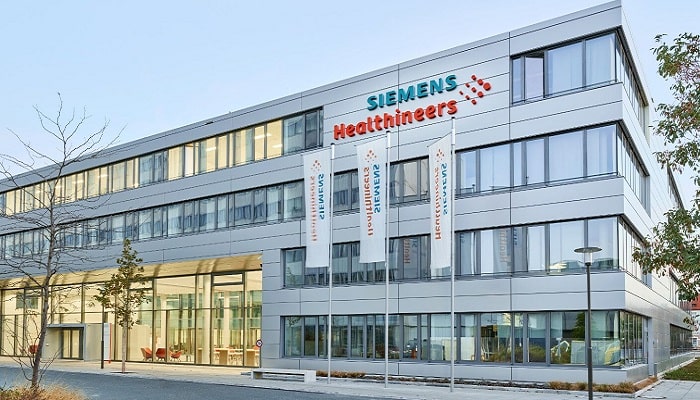Siemens Healthineers and IBM Deutschland are introducing an open digital platform that will advance the networking of the German healthcare system and expand the infrastructure for the provision of digital services. Both partners are bringing their experience and expertise together for the project. “This platform is the enabler for the digital transformation of the healthcare industry and lays the foundation for networking the players,” says Dr. Christian Kaiser, Head of Digital Services Central Western Europe, Siemens Healthineers. “For example, we can get the full benefit from existing and future digital patient records if the patient information is complete, up to date, and available to all relevant and appropriately authorized parties.”
The new platform, “teamplay digital health platform connect,” uses international standards like IHE (Integrating the Healthcare Enterprise) to simplify the secure sharing of patient data between service providers. The technology is already successfully used by Siemens Healthineers in Switzerland (EPD) and Austria (ELGA)1 and the company is now taking the gained experience to Germany.
“The teamplay digital health platform connect reflects IBM’s strategy of using our technologies to make secure industry platforms possible,” observes Christian Noll, General Manager, IBM Global Business Services (GBS) for the German-speaking countries. “Working with Siemens Healthineers gives us the foundation for mobile solutions. Patient security and privacy are our top priority. Our services at the Frankfurt data center, which have been internationally certified on numerous occasions (ISO 27001), ensure that only authorized persons have access to this information.”
The solution is also designed for third-party products and services. In the future, the platform will be available for third parties to add new, innovative apps and digital solutions and make them available to the healthcare industry. “Patients aren’t interested in the obstacles to healthcare. They need fast solutions. With its structural master plan, UKSH has implemented the architectural infrastructure and digitalization milestones and is now meeting the challenge of networking the treatment processes of all parties. This innovative ‘multi-outlet power strip, can contribute to the digital evolution of different providers and applications. The goal is to significantly enhance the effectiveness of the hospital for patients through highly personalized offerings and more time for humane care. The concept, which consists of networking, added value for patients, and an increase in information for physicians and healthcare, can help achieve this,” said Prof. Dr. Jens Scholz, CEO of the University Hospital Schleswig-Holstein, Germany.
“Digitalization is right at the top of the agenda for us at Charité,” says Professor Heyo K. Kroemer, CEO of Charité – Universitätsmedizin Berlin. “Data-sharing plays a critical role at the regional and also national levels when it comes to research, for example. We’ve used or tested various platform technologies for this purpose, including the digital platform from Siemens Healthineers. For the digital transformation in the healthcare sector to succeed, such offers are needed, especially if they fit into the context of the Federal Government’s digitalization efforts.
For security reasons, Siemens Healthineers and IBM are splitting the operation of teamplay digital health platform connect between two German-based data centers. Siemens Healthineers maintains the patient register, while IBM holds the document index. The patient register manages patient identification data (demographic data like names and contact details) that participants have communicated to the platform. These registrations are always made with the agreement of the data subject. The principal task of the patient register is to bring together the various data elements associated with an individual from among all the participants and combine them correctly to generate an identity. The documentation index manages administrative details related to the documents that participants contribute to the platform. Here too, new documents can be prepared only with a valid declaration of consent from the data subject. In this case, the documents or data aren’t stored centrally, they’re retained by the participant contributing the information: the hospital, for example. In other words, no additional digital record solution is created. Each data center is secured using recognized security standards. Splitting the data between two centers means that only part of the data would be compromised in the unlikely event of a hacker attack. Any data potentially harvested would be of no value to the hacker without the matching “second half.”
The German government intends to drive the digitalization of healthcare during the current parliamentary term. Under the coalition agreement, from 2021 everyone with statutory health insurance must be able to have a digital patient record containing important documents like doctor’s letters, medication plans, emergency data, and proof of vaccinations2. But until now there hasn’t been a platform of this kind based on international standards that networks the various players in the healthcare system. The new platform, “teamplay digital health platform connect,” is intended to make a crucial contribution that will support the government’s digitalization initiative in this area.
Siemens Healthineers AG is shaping the future of Healthcare. As a leading medical technology company headquartered in Erlangen, Germany, Siemens Healthineers enables healthcare providers worldwide through its regional companies to increase value by empowering them on their journey towards expanding precision medicine, transforming care delivery, improving the patient experience, and digitalizing healthcare. Siemens Healthineers is continuously developing its product and service portfolio, with AI-supported applications and digital offerings that play an increasingly important role in the next generation of medical technology. These new applications will enhance the company’s foundation in in-vitro diagnostics, image-guided therapy, and in-vivo diagnostics. Siemens Healthineers also provides a range of services and solutions to enhance healthcare providers’ ability to provide high-quality, efficient care to patients. In fiscal 2020, which ended on September 30, 2020, Siemens Healthineers, which has approximately 54,000 employees worldwide, generated revenue of €14.5 billion and adjusted EBIT of €2.2 billion.

















